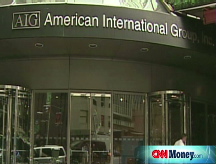Paulson 'actively' eyes bank investment
The White House confirms that the Treasury is looking at buying stakes in the nation's banks.
NEW YORK (CNNMoney.com) -- The Treasury Department is "actively" looking at buying equity stakes in some of the nation's banks, according to White House officials.
At a briefing Thursday morning, White House spokesman Dana Perino confirmed reports that the United States could soon join the United Kingdom, Iceland and Italy in announcing a plan to inject capital directly into their troubled banking systems.
Then later, after a punishing day for stocks, President Bush's chief economic adviser, Edward Lazear, told CNN that capital injections are being considered as an option.
Lazear said officials were still working out how that option and other tools available to the Treasury under the recently passed $700 billion financial rescue plan could best be used.
"We have to make sure that we get it right," Lazear said. He also noted that while it may take days or weeks to get the full plan up and running, "the markets will be reassured in very short order."
Capital - a measure of a bank's strength - is what makes lending possible. For the past month, as major financial institutions have failed, banks have been hoarding their cash to make sure they don't get caught in a capital squeeze. That in turn has caused a cutoff in credit needed by businesses and consumers.
It's not clear what form the government intervention would take, but Treasury is likely to end up with ownership interests in the banks that receive the capital.
"These capital injections are something that Secretary Paulson is actively considering," said Perino. She said she couldn't comment on the timing or extent of such investments.
The move would be made under the $700 billion Wall Street bailout law enacted on Friday.
The focus of the bailout was a plan to have Treasury buying damaged mortgage-backed securities from banks and financial firms. The aim is to help firms improve their balance sheets and profit prospects and attract capital from the private sector. But the administration is now arguing that direct investment is part of the powers under the act.
The Treasury's latest move comes as banks around the world struggle to deal with the global financial crisis. Other governments have already stepped in to nationalize banks.
British Prime Minister Gordon Brown announced Wednesday morning that the British government would make available £50 billion, or $87 billion, to the nation's eight largest banks in an effort to shore-up their capital positions. In return for the infusion of capital the British government will receive preferred shares of those banks.
Iceland seized control of its three largest banks. Officials with the Italian government have said they are looking at their own bank rescue plan similar to the British efforts.
Treasury Secretary Henry Paulson first hinted of the U.S. effort to directly shore up banks on Wednesday in a speech about the bailout. He said increasing capital investment in the nation's banking system is one of Treasury's goals, and he seemed to suggest that such capital could come directly from taxpayers.
The new law gives "broad flexible authorities for Treasury to buy or insure troubled assets, provide guarantees, and inject capital," Paulson said.
Paulson vowed to "use all of the tools we've been given ... including strengthening the capitalization of financial institutions of every size."
The reports cheered some experts who had argued that such direct investment was the best way to help financial companies.
"The proper way to resolve a banking crisis is not to buy toxic assets but rather to recapitalize banks directly via injections of public capital (in the form of preferred shares) into distressed but solvent financial institutions," wrote Nouriel Roubini, professor of economics at New York University's Stern School of Business, on his blog Thursday.
Treasury had been reluctant to move in that direction during debate over the bailout bill and it is significant that officials are now talking about the possibility of such direct investment, Roubini wrote.
"The 180-degree turn in the Treasury position is driven by the disastrous market reaction to the passage of this legislation and to the realization that U.S. banks are in such a deep trouble that, absent a direct partial public takeover of the banks, this severe financial crisis will get much worse," wrote Roubini.
Jaret Seiberg, a financial services analyst at the Stanford Group, said in a note that he believes buying shares would be a good move for banks and their shareholders.
He said even if government stock purchases dilute the value of shares held by investors, they are unlikely to wipe out current holdings. ![]()





